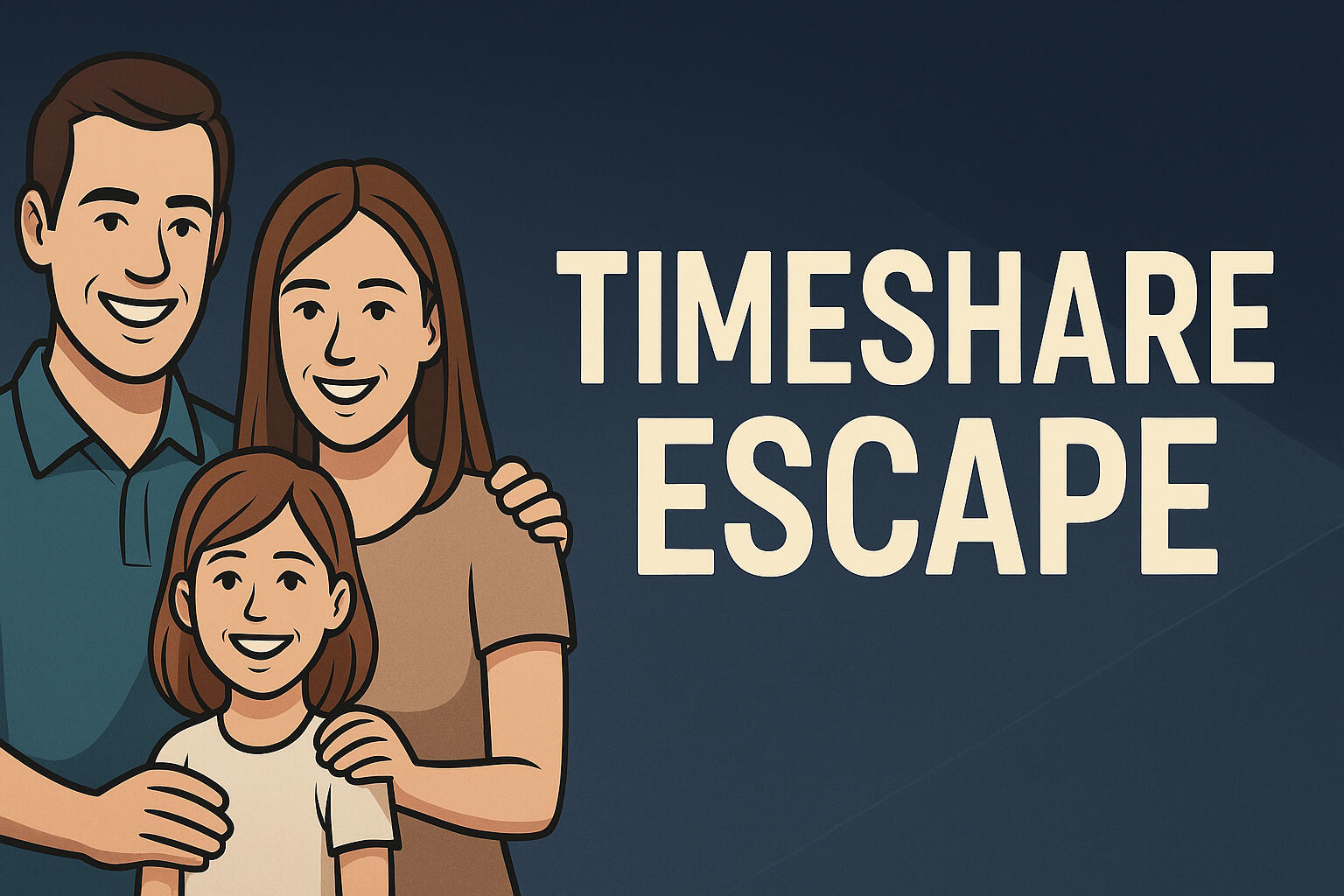
Timeshare Escape
A true story of how I got trapped in a lifetime vacation contract — and fought my way out. This is for anyone who’s ever felt stuck, pressured, or misled… and wants a real way out.
How to get out of a timeshare
Timeshare cancellation guide
Real story of escaping timeshare
30-day money-back guarantee if you’re not satisfied.
What’s Inside:
25+ complaint platforms
8 state-by-state letter templates (CCPA, VCDPA, CPA, CTDPA, UCPA, TDPSA + Generic US)
Step-by-step exit playbook
Credit-recovery roadmap & dispute-letter templates
Fillable PDF forms & DOCX templates
Keep reading to know my story...

It all started with an ad…
It all started one ordinary evening as I was scrolling through my Instagram feed.
That’s when I saw the ad:
"3 nights at a luxury resort for just $199. Bring your family."It looked like a seasonal promotion — just a great hotel deal.
We were living in Silicon Valley at the time. I’m an immigrant, and my wife had moved to the U.S. only a year earlier. It seemed like a good chance to take a short vacation — especially at such a low cost.I thought it was just a winter discount — that’s what the ad made it look like.Weeks later, I got an email reminding me about the trip we booked. We picked dates and planned to drive from Northern California to the resort, which was somewhere near San Diego.A long road trip? We loved those. So we packed up and hit the road, looking forward to a cozy family weekend.

The first red flag
We arrived around 11 PM — exhausted from the drive but excited for the stay.We stepped into the lobby… and saw something strange.There was a woman screaming at the front desk — furious, emotional, yelling.
We assumed she was unstable or maybe homeless. The staff was trying to calm her down, but she wouldn’t stop shouting.At the time, we didn’t think much of it. We were tired, it was late, and we just wanted to check in.Only much later did we realize what had really happened.
That woman wasn’t crazy. She was likely someone who had gone through exactly what we were about to go through — and we ignored her warning.That was the first red flag.
But we missed it completely.

Too good to be true
The suite was beautiful. Two floors, a spacious bedroom, a fully equipped kitchen, a large table, a balcony, and an amazing view.Outside — green golf courses, rolling hills, palm trees, people riding golf carts, everything trimmed and perfect.It was like a dream.
Staff were cheerful, friendly, and helpful. Everyone looked like they belonged to a world where nothing went wrong.The next day, we were assigned a young woman who gave us a short tour and helped us get familiar with the place.
She offered to drive us around on a golf cart.
She smiled, chatted, and showed us various parts of the resort.Then she said:
“There’s just one thing you need to do — a short presentation. It’s part of the promotional package.”We knew about it. That was part of the deal — $199 for 3 nights, in exchange for sitting through a 1–2 hour talk.We didn’t think much of it.So we said, “Okay. No problem.”
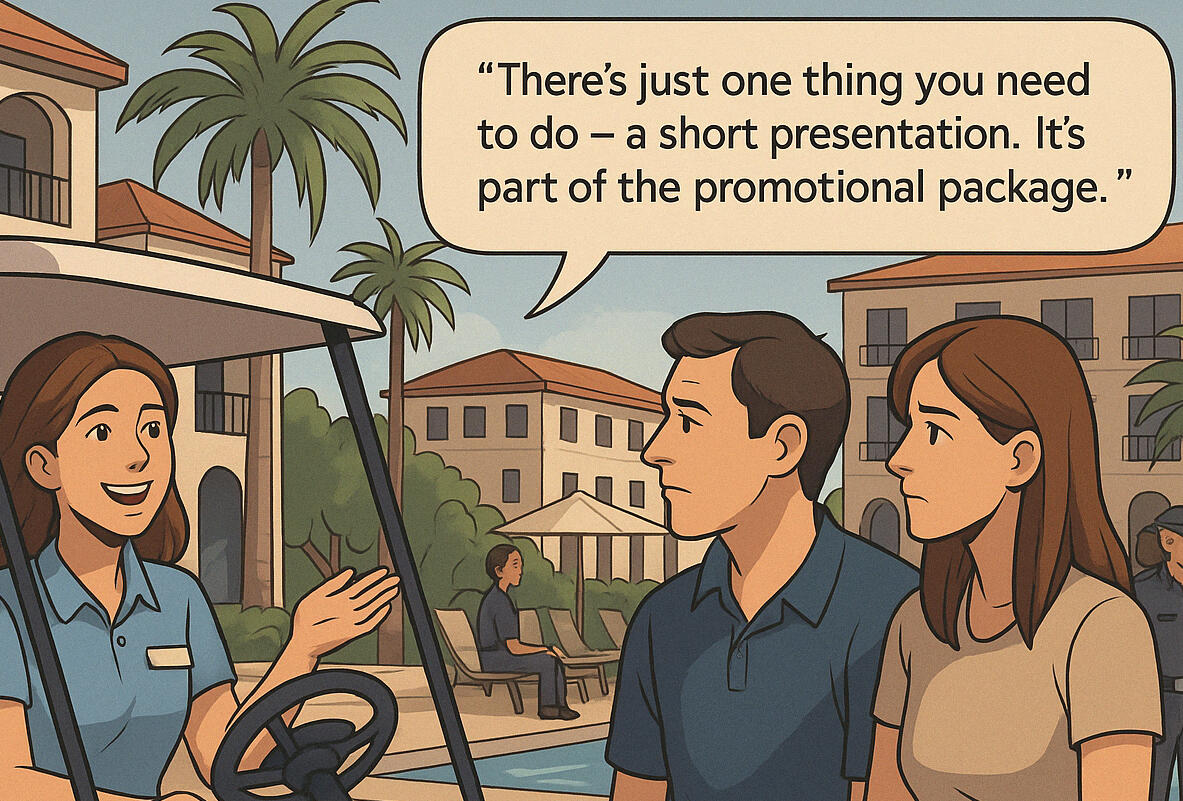
The pressure
The presentation started at noon.We were taken to a separate building and seated at a table.
Every family had their own table, and each table had a “representative” sitting with them.Our daughter was taken to a kids’ playroom. There were games, toys, snacks, and other kids. She was happy — and we were glad she’d be occupied.The presentation began.
A woman stood in front of the room and told a passionate story:
How the “Vacation Club” changed her life. How she and her husband could never afford to travel. How now, thanks to this system, they traveled the world.It was emotional. Motivating. Designed to make you believe.
But the real persuasion didn’t happen on stage — it happened at your table.Our assigned rep started telling us her own story.
She said she was from a small town. That joining the club helped her family.
She brought her father, her mother, her siblings into it.She looked into our eyes and said:
“This changed my life. I just want the same for you.”We didn’t say no.
But we didn’t say yes either.We just said:
“We need time to think.”She nodded. Then said:
“Let me bring someone who can explain it better.”Then came the closer.He was calm. Confident. Masterful.
He started fast-talking — numbers, charts, comparisons, savings, taxes, math, dreams.We were already tired. We didn’t eat. We hadn’t had coffee.
We were sitting there for almost four hours.And we were getting weaker with each minute.
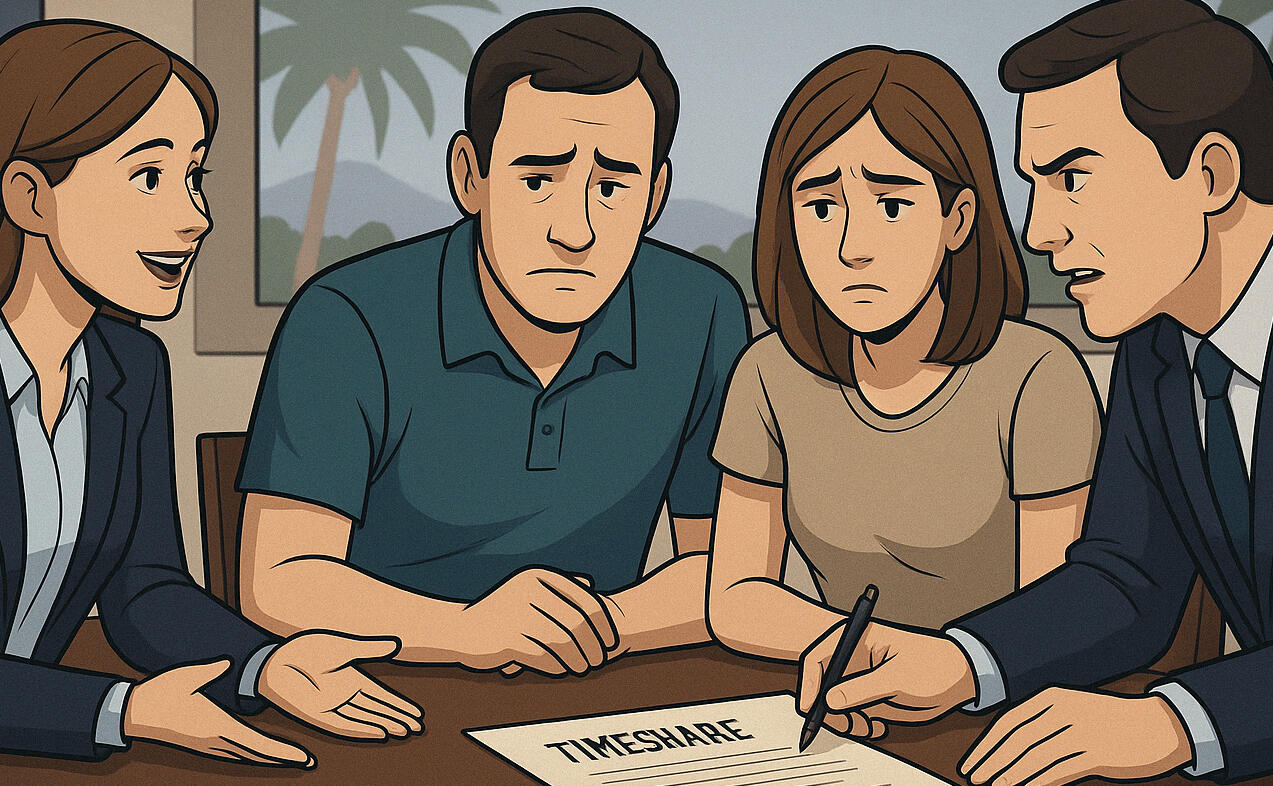
The signature
We told them:
“We don’t have that kind of money right now.”They said:
“No problem. We’ll open a credit card for you. Takes five minutes.”And they did.Then they took us to a legal office.A man — their in-house attorney — greeted us.
He started a video recording.
He asked scripted questions.
He smiled. We nodded.
He pointed to places to sign.Our English wasn’t perfect at the time. Maybe 70% understanding at best — and in this stressed state, far less.But we signed.
We signed it all.They handed us two free zoo tickets.
“Enjoy San Diego,” they said.We left the room… dazed.

The regret
That night, we were wrecked.
My wife and I both had headaches. We felt sick. Emotionally drained. Like we’d been in a psychological battlefield.We didn’t speak much.We just lay there, staring at the ceiling, trying to understand what just happened.The next morning, we went to the zoo.
The tickets they gave us were only for two people — we had to pay for our child’s admission.
Small detail. But symbolic.We walked around, smiled for the kid, tried to act normal.
But something was broken inside.We returned home with an unbearable feeling that something terrible had just happened.

The letter that was too late
Back in Silicon Valley, we didn’t do anything for a few days. We were numb.About six days later, I finally opened the documents and read them carefully.That’s when I saw it:You may cancel your timeshare agreement by sending a physical letter to this address within a specific number of calendar days (varies by state — in California, it’s 7 days from the date you signed the contract).No calls.
No emails.
No online forms.
Only paper. Only a physical letter.I called the company in panic.
The representative on the phone responded with robotic sympathy:
“We’re sorry. We can’t accept cancellation by phone.”I rushed to write the cancellation letter.
But it wasn’t easy. What should I say?
How do I format it? What tone should I use?
I spent hours trying to make it perfect — knowing that every minute mattered.Eventually, I printed it. Signed it. Stuffed it in an envelope.
Drove straight to FedEx. Paid for overnight delivery.But it was day 9.Too late...

Already signed? Don’t panic!
Here’s what you can still do — based on what worked for me
Step 1: Read your contract
Step 2: Look at the signature date
Step 3: Send a cancellation letter (we’ll help generate one)
Step 4: Don’t let them manipulate you
Step 5: Be persistent. Very persistent!
Know Your Privacy Rights (CCPA & Beyond)If you live in California, you can demand the resort delete any video or personal data it holds (CCPA §§ 1798.105).Other states already allow a similar “right to delete”: Virginia, Colorado, Connecticut, Utah, and Texas.
Check whether your resort operates in one of these states—if it does, your request still applies.Need a state-specific cancellation letter?

Alone against the system
Then came the research.
I dove into forums, complaints, government websites.150,000 people try to cancel their timeshare every year.
Almost no one succeeds without legal help.I contacted real attorneys — three of them in Silicon Valley.
They all said the same:
“This is almost impossible to win. They have the best lawyers in the business.”I started getting calls from “timeshare exit companies.”
One wanted $12,000.
Another said $5,000 up front — then we’ll talk.It was a second scam — on top of the first.I realized:
If I want to get out — I have to fight alone.And that’s exactly what I did.
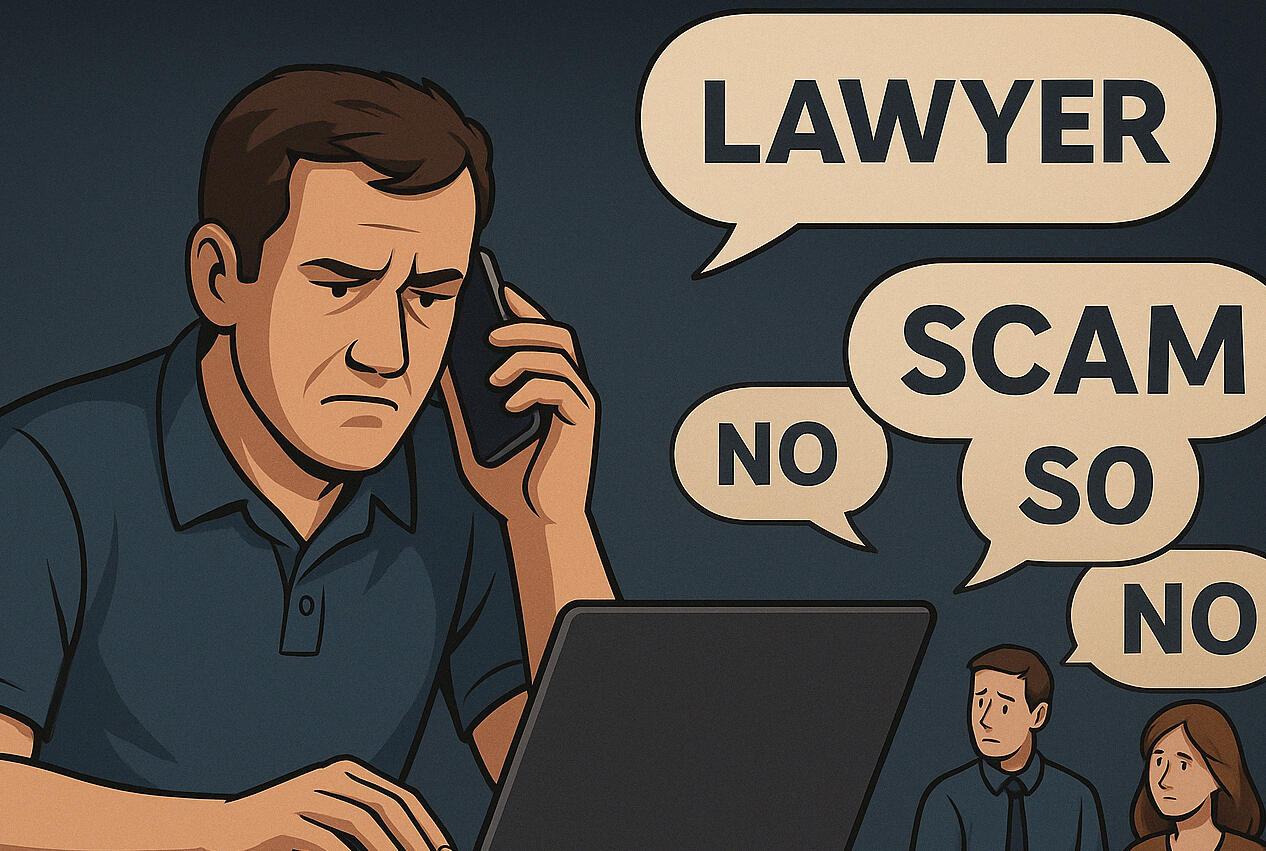
What They Don’t Tell You…
Everyone smiles when they sell you a timeshare.
They tell you stories of freedom, savings, and adventure.
But here’s what they don’t tell you — and what you’ll only find out after it’s too late:
“The annual fees never increase.”False. They do. Almost every year.Maintenance fees typically rise by about 4% per year.
It might not sound like much now, but over 5–10 years, it adds up to a financial trap you can’t escape.
You have no control over this — they can raise fees whenever they want.
“This is a good investment.”Absolutely not. This is not an asset — it’s a liability.You can’t resell your timeshare.
There is no open market. The demand is near zero, and the supply is infinite.
Just remember how you were sold:
• Gifts
• Emotional stories
• Discounts
• PressureThat’s not how good investments work.
“You can cancel anytime.”Lie.Once you’re in — you’re locked in.
They will tell you there’s a “cancellation window” but hide it in legal jargon.
And after that? You’re stuck. For life.
“It ends when you die.”Sounds comforting. Until you learn what really happens.Timeshare contracts often transfer to your heirs.
And if your children don’t want it? Too bad. They’ll be contacted, threatened, and guilt-tripped into keeping it.Some families spend years trying to disentangle from inherited timeshares.
“We want you to be happy.”Only until you try to leave.Try calling them and saying you want to cancel.
Watch how quickly those smiles vanish.
Suddenly, no one returns your emails. You’re routed to voicemail.
Your account is locked. You’re treated like a threat.
This is why I created TimeshareEscape.us
To shine a light on what no one else talks about — and to give you a real, working way out.
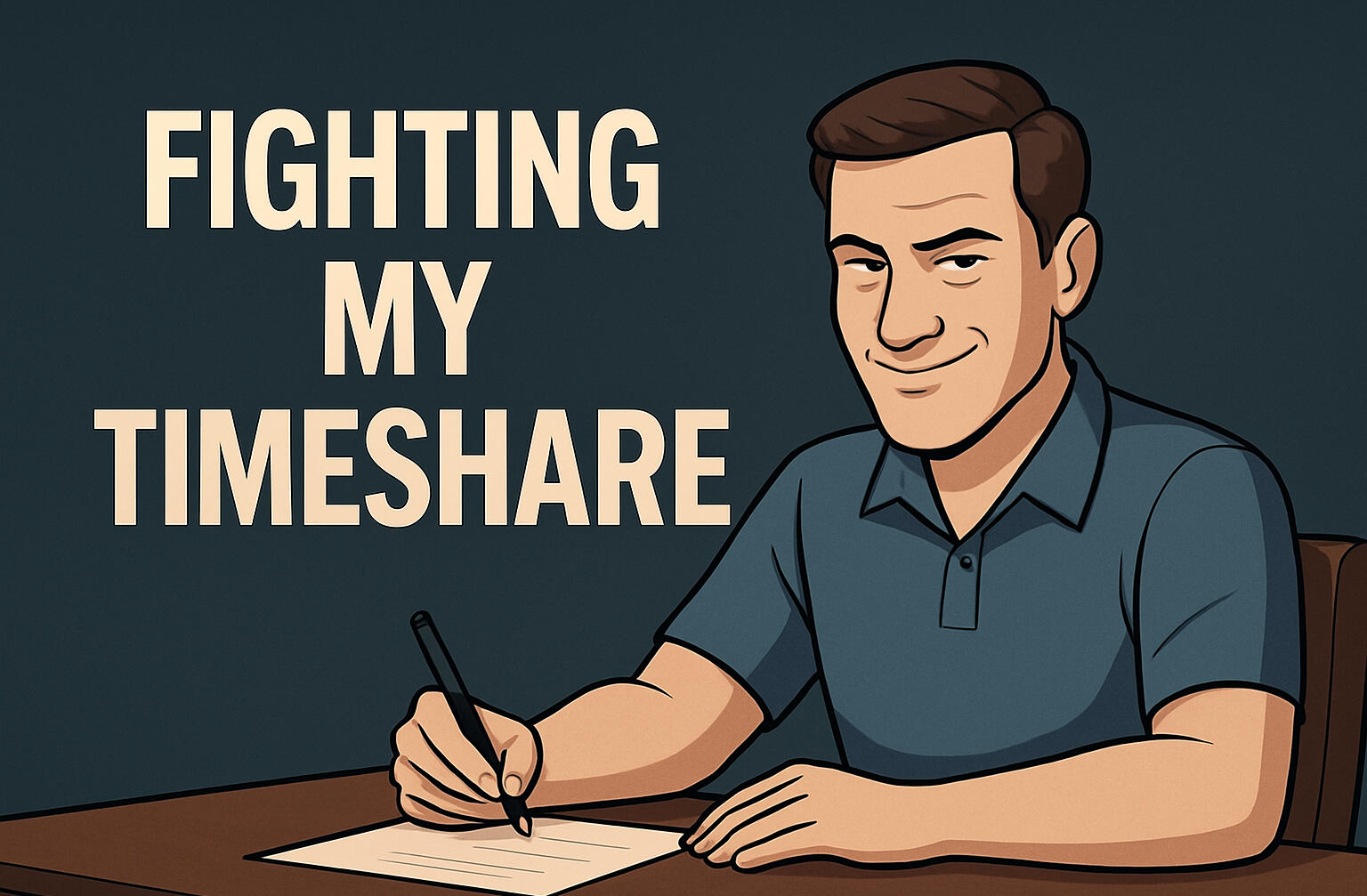
Top 5 Places to Complain 📢
Google Maps – the first thing people see in search
Yelp – still shows up on page 1
Better Business Bureau (BBB) – regulators watch it
FTC Complaint Assistant – creates a federal record
Timeshare Users Group (TUG) – biggest owner forum
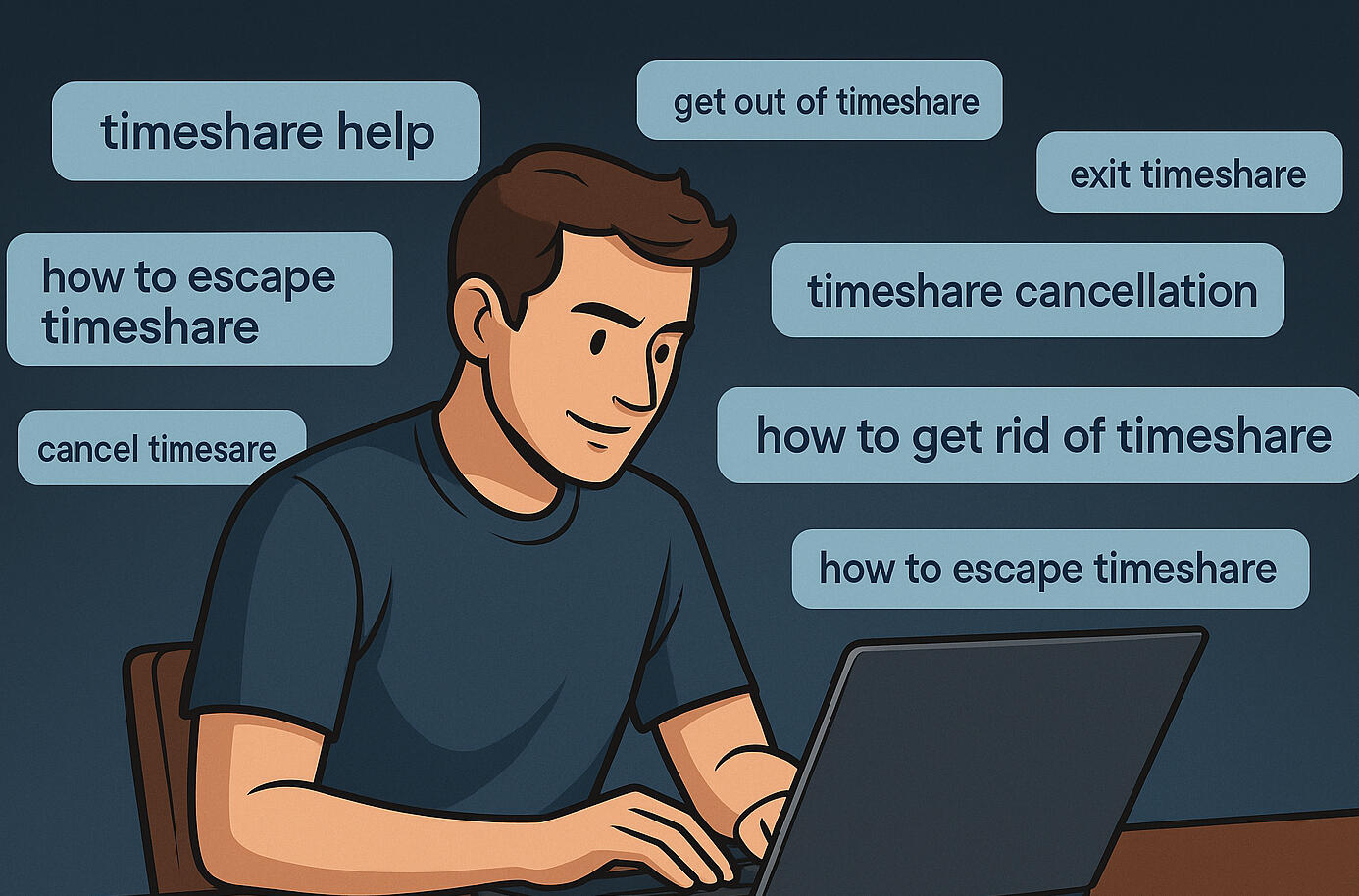
Common Timeshare Search Queries:
get rid of a timeshare
cancel your timeshare contract
how to terminate a timeshare agreement
exit your vacation ownership
end your timeshare obligation
timeshare cancellation guide
stop paying timeshare fees
timeshare exit strategies
timeshare contract rescission
avoid timeshare scams

FAQ
Q: Is this really DIY, or do I still need a lawyer?
A: Tested without attorneys—no legal jargon, just plain-English steps.Q: How quickly will this work?
A: Most members see a path to termination in 3–6 months.Q: What if I’m outside California?
A: We include federal FTC-Act templates and show you exactly how to adapt our letter framework to any state’s privacy or consumer-protection law.
I am not a lawyer; everything here is personal experience for educational purposes only.